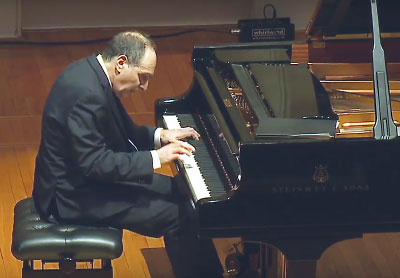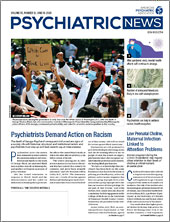Pyotr Ilyich Tchaikovsky’s death in 1893 is commonly attributed to cholera (outbreaks were a reoccurring problem in 19th-century Russia), but the exact cause of death is still a matter of scholarly debate. As psychiatrist and award-winning pianist Richard Kogan, M.D., plays the gentle closing notes of Tchaikovsky’s Pathétique Symphony written that same year, he hears the most eloquent suicide note ever written.
Kogan describes Tchaikovsky’s music and more in the 30-minute musical lecture titled “The Mind and Music of Tchaikovsky.” The video is a condensed version of Kogan’s typical crowd-favorite lectures at the APA Annual Meeting, which combine discussion about the link between musical artistry and mental illness with piano performances by Kogan offering listeners a sense of the composer’s state of mind at the time.
Many APA members are familiar with Kogan, a clinical professor of psychiatry at Weill Cornell Medical College, artistic director of the Weill Cornell Music and Medicine Program, and co-director of the Weill Cornell Human Sexuality Program. He has given his lauded lectures/performances on the link between musical artistry and mental illness at many meetings past. At APA’s 2020 Annual Meeting, which could not be held due to the COVID-19 pandemic, Kogan was scheduled to perform as part of the William C. Menninger Memorial Convocation Lecture.
In his video, Kogan explores Tchaikovsky’s despondency as well as his shame over his sexual orientation, and how these feelings led to the creation of some of history’s greatest pieces—from the melodic (and oft-parodied) love theme from Romeo and Juliet to the structurally groundbreaking opening of his first concerto.
Though a video cannot fully recapture the experience of listening to live music in a communal setting, the video format enabled Kogan to add a few elements not available in a live presentation. These include having relevant music play in the background while Kogan explains Tchaikovsky’s feelings and an orchestral background to some of the pieces.
Kogan noted that music in one form or another has long served as a source of solace during difficult times. “Music has the extraordinary power to lift spirits and soothe anxiety,” he said, noting that Tchaikovsky himself used musical composition as a tool for self-healing (He once wrote, “Without music, I would go insane.”). Kogan said he hopes his video might likewise provide some solace from the stresses of COVID-19 that his fellow psychiatrists and others are facing. ■
The video “The Mind and Music of Tchaikovsky” is posted
here.

